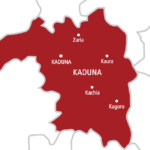In the time it took to screen and match the blood, she was dead, remembers her Uncle Mansur Tukur, head of Safe Blood for Africa.
“Every single moment in Africa, a child dies of anaemia caused by malaria,” he says. “That’s the impact of mortality—lives lost as a result of no blood.”
A rising consensus is that, available and ready blood could help save more lives in emergencies—from traffic crashes to women losing blood during delivery and babies stricken with anaemia, according to Dr Abigail Bozegha of the National Blood Transfusion Service, which regulates blood collection and supply through its 17 centres nationwide.
The safest source is voluntary, unpaid donation, which is flagging in Nigeria.
“Only 10% of our blood supply is from voluntary non-remunerated blood donors,” said health minister Onyebuchi Chukwu on World Blood Donor Day this year, calling for greater effort to reach a target 100% of blood supplies from voluntary donations by 2020. At present, only 62 countries have their blood supply completely from unpaid donations; 40 nations collect less than a quarter of supplies from voluntary donations—half of them in high-income countries home to only 15% of the world’s population.
The case for blood
But the sheer figures are against nations like Nigeria, beset by numbing death rates among vulnerable populations of children and women. More than 50,000 mothers die each year—an equivalent of 136 women daily—in sub-Saharan African due to blood loss during pregnancy and labour, according to published research.
They also show a history of deaths over the years—up to 26% of maternal deaths due to bleeding in sub-Saharan Africa were directly related to lack of blood. In Nigeria, an estimated 23% of maternal deaths are due to severe bleeding.
“When a woman delivers and bleeds above 50 millilitres and if nothing is done within two hours, she will exsanguinate—bled out all the blood she has in her body,” says Dr Tunde Segun, country director of Evidence for Action, which runs a campaign, MamaYe, for better women and children’s health in a handful of Nigerian states.
Post-partum haemorrhage known as bleeding after birth is fatal because once it starts, death can occur in around two hours, compared with 10 hours for eclampsia and 72 hours for obstructed labour, experts explained at a media dialogue on blood donation organised by Champions for Maternal and Newborn Health (C4MNH)—a coalition of health writers pushing women and child health via social media.
Meeting demands
“We must have a way that everybody must come together to ensure that mothers and babies who need blood can get it in a reasonable amount of time,” Segun advocates.
Nigeria needs between one and two million units, but the blood is not readily available in amounts that the country needs. Latest supply stands at 84,000 units of voluntary donations through NBTS, down from a previous annual 100,000. With 160 million, Tukur estimates just 1% of the population donating blood could supply the country’s entire requirement.
“Nigeria has a lot of potential but there are a lot of dragons,” he says, referring to challenges, myths and taboos that impede unpaid donations. Among them are myths that giving blood could reduce male virility, as well as concern about blood being sold.
Frequently, donations are for family, but Tukur says the country must move from family-replacement donation to unpaid giving.
“We have potential to create a system where a woman doesn’t die from shortage of blood or children die from anaemia in malaria just because they couldn’t access blood on time.” Getting unpaid donations means filling the country’s pool of potential donors.
Tukur questions whether Nigeria has youths living risk-free lifestyle who could become a life-line to NBTS, essentially a target group to tap from. It is a shaky proposition, says Club 25—an association of volunteers who have sworn to continue giving blood throughout their youth. Club 25 commands up to 100 members in Abuja alone.
Healthy youth?
Inasmuch as it wants young people to join it and is pulling out strategies to get them, Club 25 is also concerned about youth lifestyle.
“Thirty percent of Nigeria’s youths are not ready to live healthy lifestyles,” says Karimat Musa, vice president of the club in Abuja.
That should make difficult answers for the dozens of lifestyle questions that demand response at each blood donation session. But Club 25 still faces youths demanding payment for donation or completely reluctant, and still is not allowed in public schools to give awareness talks without express permission of the education ministry.
Proponents advocate that communicating the benefits of donating blood—for the donor, the community and the recipient—will help recruit more voluntary donors, or at least get ambassadors in line.
Proponents also look to the media to do the grunt advocacy work—in how it reports issues to the public.
The focus is “not just the gory statistics of women dying, but also to share some of the success stories,” Segun says about the thrust of the MamaYe campaign.
Popular sayings point to how pregnancy is regarded, for instance. At least one proverb in Hausa has words to the effect that a pregnant woman has one foot in the grave.
In Yoruba, giving birth invokes a salutation eku ewu omo, a greeting for having survived. “It is like you have escaped some strategy, which should not be, because pregnancy is a physiological process, not an illness,” Segun.
Up to 15% of all pregnancies might develop complications—and one of the complications “we keep having has to do with blood,” he says.
Referring again to the positive outlook, he says, “If we begin to project some of these survival stories, it will stimulate people to act.”
Challenges against blood donations
In the time it took to screen and match the blood, she was dead, remembers her Uncle Mansur Tukur, head of Safe Blood for Africa.“Every…



